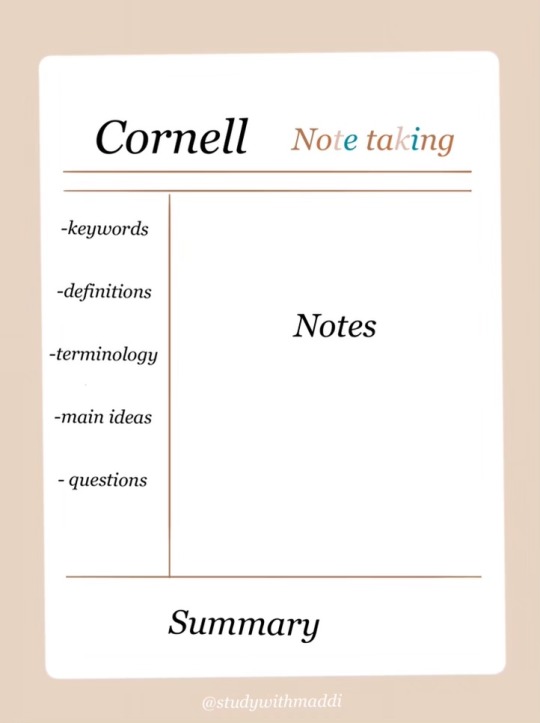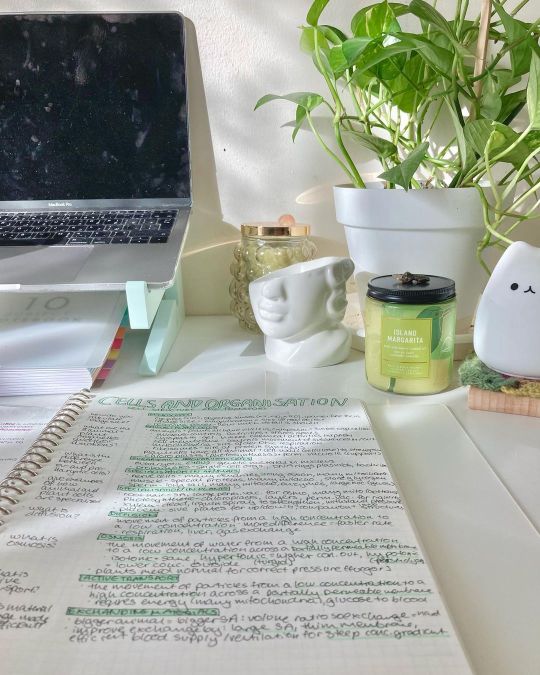#studyhacks
Photo

i had 2 tests this week and 5 more in the next month, so stressed rn!!!
#qotd#a#studyadvice#study#studytips#studying#student#studentlife#studyhacks#notes#notetaking#aestheticnotes#productivity#revision#exams#studygram#studyharder#studytip#studyaesthetic#studydesk#studyblr#studysession#studyingtime#studyingcommunity#productiveday#studyblog
220 notes
·
View notes
Text
Effective Note Taking: Tips to Improve Your Study Habits
Note taking is an essential part of studying, and developing your own note taking style can significantly improve your learning experience. However, note taking should not just be a process of copying information from the board or textbook. It should be personalised to your learning style and optimised for effective retention and understanding. Here are some tips to improve your note taking habits:
Structure Your Notes for Organisation and Revision
Your notes should have a clear structure with headings, subheadings, and lists for better organisation and revision. Writing notes as if you were explaining the topic to someone who does not take the course is a good practice to ensure that your notes are clear and logical.
Additionally, labelled diagrams and concept maps can help you visualise and understand complex information. Studies have shown that visual aids, such as images and diagrams, are easier to remember and recall than text alone.
2. Highlight and Use Colours to Emphasise Key Points
Highlighters and coloured pens are not just for making pretty notes. They can also help you categorise and emphasise key points, making them easier to remember. Develop your own colour coding system, using different colours for different topics, definitions, or important information. Symbols, such as stars or underlines, can also be used to create your own coding system.
3. Use Your Own Words and Avoid Copying Verbatim
Avoid the temptation to copy everything word for word from the board or textbook. Instead, focus on deciphering the key information and paraphrasing it into your own words. This not only saves time but also helps you consolidate your understanding of the topic. You can still incorporate high-level vocabulary and terminology into your notes but try to write most of the content in your own words for better comprehension.

4. Consider Using Cornell Notes
Cornell notes are a popular note taking system recommended by universities such as Cornell and Harvard. They include a heading at the top, a column on the side for keywords, main ideas, and questions, a large section in the middle for class notes, and a summary at the end for revision. However, note taking is a personal process, and you should incorporate elements that work for you.

In conclusion, developing your own note taking style can significantly improve your study habits. Remember, note taking should be a personalised process that suits your learning style and helps you retain and understand the material better.
StudywithMaddi x
#studytips#notetaking#studyhacks#studyhabits#education#learning#Cornellnotes#colours#organisation#revision#memory#effectivestudy#learningtips#studentlife#studysmart#studymotivation#visualaids#studysuccess#studyskills#studywithmaddi
22 notes
·
View notes
Text
💡 Stress-Free Tips for Primary Exam Preparation 📚✨

Preparing for Primary Exams: Stress-Free Tips for Parents and Students
Hey, parents and students! 😊 As the primary exam season approaches, we've got your back with some stress-free tips to ace those exams and keep the good vibes flowing! 🌈 Let's dive in:
#StudySmart 📅: Establish a realistic study schedule tailored to your child's needs. Balance is the key to success, so make sure there's time for both study and well-deserved breaks. 🕒
#OptimalEnvironment 🌟: Create a zen study space – quiet, well-lit, and distraction-free. Say bye-bye to electronic devices during study time! 🚫✨
#HealthyHabits 🍏🏋️♂️: Emphasize the importance of a balanced lifestyle. Regular exercise, a nutritious diet, and enough sleep are the superheroes fighting stress and boosting brainpower! 💪🧠
#RevisionNation 🔄: Regular revision is the secret sauce. Break down the syllabus, allocate specific revision time, and avoid last-minute cramming. Your child's memory will thank you later! 📖✅
#ExtraSupport 🚀: If a subject feels like a mystery, seek extra help! Consider a tutor, classes, or dive into online resources. Learning is a journey, and it's okay to ask for a little guidance along the way. 🤝🔍
In conclusion, we believe in a balance between success and well-being. Let's make exam prep a breeze with structured schedules, optimal environments, healthy habits, regular revision, and the support your child needs! 🚀🌈 Remember, their mental and physical health always comes first! 💖✨
#ExamPrep#ParentingTips#StudyHacks#HealthyLiving#SuccessJourney#StressFreeLife#EducationMatters#PositiveMindset#education centre#language school#coaching
0 notes
Text

Who needs textbooks when you've mastered the art of studying ambience.
0 notes
Text
How to Work Effectively for the New Year <3
Number 1 - Focus
To work effectively, you have to be able to focus. Although, if you're like me then focusing can be hard when you're easily distracted; so here's some advice to help you concentrate!
Silence your notifications and set your phone far away from you.
My phone distracts me all the time. If it's next to me whilst I'm trying to study then I can never not look at it to see if someone has messaged me or sent me something. It also ends up just demotivating me. My best advice would be to just turn it on silent and put it on the other side of the room, especially if you're studying at your own personal desk at home - if you have a bookcase or shelves on the other side, I would recommend putting it there :)
Number 2 - Best Hours to Study
It's been found that most students' brains tend to be the best in the morning, especially after a good night's sleep and a nutritious breakfast. This could potentially make the morning a good time to open a textbook and study, or even review notes from the previous day. This means that the brain is more alert, allowing students to have a better ability to recall details like names, places, dates, and facts.
When it comes to the afternoon, then this is the best time for students to integrate new information with what they have already learnt. During this time, then students are supposedly able to create better connections and make the information they have previously learned more meaningful.
Day Studying Benefits:
Brain is refreshed and ready for information, natural light keeps you alert, doesn't disrupt your sleep schedule, and able to study with classmates.
Night Study Benefits:
More peace and quiet, fewer distractions and interruptions, a clearer mind for creative thinking, and can help improve recall.
There aren't any specific times for studying that I will put down because it differs for everyone, but it definitely helps if you create a study schedule - whether it's in the morning or afternoon, it's whatever is best for yourself.
Number 3 - Your Study Space
Sometimes the surrounding areas can be super noisy or it could even be too calm for your liking - which could be demotivating.
If it's too noisy, maybe try going out. I understand that there can be problems with trying to do this if you still live with your parents or live in a rural area where there's practically no buses and you don't drive; but, in my opinion, I love studying at places like a library, or cafes. My personal favourite for studying is Wetherspoons (I'm pretty sure this is just a UK thing so I apologise to everyone that doesn't live in the UK), this place is basically a pub but the food and drinks are so inexpensive and if you're not wanting anything too special drink-wise then you can order a hot drink (and you then get refills for free!) - honestly one of my favourite places cause they also have outlets for you to charge your electronics.
If it's too calm, again I would suggest going out, or even turning on some music in the background at home. With going out then I would definitely recommend a café - they're cozy and very ambient when it comes to noise levels and seating areas but I would watch out if you're bringing electronics, most cafes (in Scotland, specifically) don't really have outlets for you to charge your stuff. If you're planning to stay home and turn on music, I would 100% recommend music that doesn't have lyrics because it helps your brain to focus on what you're studying instead of the lyrics in the background.
Number 4 - Organisation
Being organised can play a bit part in studying effectively. I won't lie, I've been so bad at staying organised for years but now that I'm in university then I've become a lot better.
I would recommend always making a to-do list of everything that has to be done, and if you're someone that has a diary that you put all of your deadlines in then I found it beneficial to put a reminder about the test a week or two weeks before the actual deadline - to give you time to start if you haven't.
Keeping your desk organised is always a great way to stay on top of studying as well - keeping it neat and tidy always helps with keeping yourself focused due to there being no distractions spread across your desk.
Number 5 - Breaks
Breaks have and always will be super important. Studying for hours and hours in a row is not the way to go - this can demotivate you very quickly, and it can also reduce the amount of stuff you actually remember in the long run.
My personal way to go is the pomodoro method. This is where you study for 25 minutes and then have a break of 5 minutes - this has been the best way for me because it allows me to learn for a solid amount of time and then relax for a short amount.
Number 6 - 3 Types of Memory
To study effectively then it's important to know what type of memory you have:
1 - Auditive memory : this means that you learn best when the material is read aloud, the best way to study according to this would be to record yourself speaking your notes etc and being able to listen to it when you can e.g. on the bus, or in the car etc.
2 - Visual memory : this means that you learn best when the material is done in picture forms e.g. mindmaps or timelines. Many people think this is just where you highlight a bunch of different points, but highlighting everything doesn't necessarily mean you're going to remember it. Making mindmaps and timelines work best for me, and you can also add pictures to make it easier to understand and remember.
3 - Kinesthetic memory : this means that you prefer to learn stuff physically. This type is not really taught about or known, but for those doing subjects like biology or physics etc, then this could work. When it comes to learning physically, then, for example, you would rather want to physically cut open a sheep's heart and examine it yourself to learn the different areas instead of watching someone do it on youtube. Many people don't use this type of memory so there's not much online about it, but using youtube would be good to find out how to utilise this type of method.
Number 7 - 3 Techniques
1 - Active recall : this is a widely used method for studying and it helps a lot of people. This is the process of actively trying to retrieve information from your memory - when you try to recall information from your mind then it makes said information stick better than if you just reread it. For example, you could create test questions as you're studying and when you've finished studying a specific section then you could put away your notes and then try to answer the questions - try not to look at your notes but if you have to then don't worry! This takes practice.
2 - Feynman technique : this is where you write down some notes or read a bit of your textbook and then stop for a moment, in that moment then you try and pretend that your teaching the material to an imaginary student. Or alternatively, you could write your notes in a way that you're pretending to teach someone.
3 - Mnemonic image method : this is where there is a picture in your mind that represents a piece of information in the real world - you're able to link the image with the thing you're trying to remember. For example, if you need to remember the Spanish word dormir (which means to sleep), you could picture a dorm room, because dorm sounds like dormir and you can sleep in a dorm.
There are many ways to study efficiently and these are only some ways that could help for the new year, but hopefully they have been helpful <3
#studying#effectivestudying#effective#study#university#highschool#secondary#college#studytips#focus#organisation#studyhacks
1 note
·
View note
Text

Struggling with coursework? We've got your back! Dive into our online coursework help for chill study vibes, useful tips, and a sprinkle of academic magic. Let's make studying kinda, sorta, almost fun! 📚✨
#CourseworkHelp#bettergrader#StudySmart#EasyLearning#AcademicSuccess#CourseworkAssistance#LearnWithUs#StudyJoyfully#ChillStudy#CourseworkCraze#StudyCool#CourseworkConfidence#OnlineLearning#StudyHacks#StudyGuides#CourseworkInspiration
0 notes
Video
How To Learn Faster
0 notes
Text
Hey there, Algebra Explorers! Did you know that algebra is like a magical world of math secrets waiting for you to discover? But here’s a fun question: Are you confident in your algebra concepts, or do you think there might be a few hidden treasures you haven’t found yet?

#AlgebraTips#MathSuccess#TestPrep#AlgebraMadeEasy#StudyHacks#Mathematics#ExamPreparation#MathTest#StudySmart#AcingAlgebra#MathSkills#TestSuccess#Algebra101#MathHelp#TestTips
0 notes
Text
How to use technology to improve your assignment writing skills

Assignments are like puzzles—every piece needs to fit just right to complete the picture. But sometimes, it feels like you're missing a few crucial pieces. Whether you're a seasoned student or just starting on your academic journey, the struggle to craft a flawless assignment can be real. That's where technology comes to the rescue! With the aid of digital tools, you can enhance your assignment writing skills, making the process smoother and the results more impressive.
Assignment writing is an essential part of academic life, but it often comes with its fair share of challenges. The pressure to create a well-structured, well-researched, and original piece of work can be overwhelming. However, fear not! In this article, we'll explore how integrating technology into your assignment writing help routine can make a world of difference.
Leveraging Technology for Research and Planning
Utilizing Online Databases and Academic Platforms
Gone are the days of spending hours in the library. Online databases and academic platforms provide a treasure trove of information at your fingertips. Platforms like JSTOR, Google Scholar, and academic journals can aid in thorough research, enriching your assignment content.
Organizing Research Materials with Digital Tools
Ever found yourself drowning in a sea of bookmarks? Digital tools like Evernote and OneNote can help you organize your research materials efficiently. Sort articles, notes, and ideas into digital notebooks, making them easily accessible when you start writing.
Creating a Structured Outline
Using Digital Mind-Mapping Tools for Organizing Ideas
Creating a clear outline is the foundation of a well-structured assignment. Mind-mapping tools like MindMeister or XMind can help you brainstorm ideas and organize them visually, ensuring a logical flow in your writing.
Outlining the Assignment Effectively with Digital Assistance
Digital tools such as Scrivener or Trello can assist in breaking down your assignment into manageable tasks. Assign deadlines to each section and track your progress as you move through the project.
Writing and Editing with Digital Tools
Grammar and Spell-Check Tools for Improved Writing
Ever had a pesky typo ruin your assignment's credibility? Tools like Grammarly and ProWritingAid act as your digital proofreaders, catching errors and suggesting improvements to make your writing flawless.
Style and Tone Analysis for Enhancing Assignment Quality
Maintaining the right tone and style in your assignment is crucial. Tools that analyze your writing style, such as Hemingway Editor, can provide insights to help refine your work and ensure it aligns with the assignment requirements.
Collaborative Writing and Peer Review
Collaborative Writing Platforms for Group Assignments
Group projects can be challenging to coordinate. Collaborative platforms like Google Docs or Microsoft Teams enable real-time editing and commenting, promoting seamless collaboration among team members.
Seeking Peer Feedback Through Online Platforms
Technology bridges geographical gaps, allowing you to seek feedback from peers beyond your immediate reach. Online forums, academic communities, or even social media can serve as platforms for obtaining constructive critiques.
Time Management and Productivity Tools
Scheduling and Task Management Apps for Efficient Work
Keeping track of deadlines is a breeze with scheduling apps like Todoist or Toggl Plan. Set reminders, prioritize tasks, and allocate specific time slots for each aspect of your assignment.
Techniques to Enhance Productivity Using Digital Aids
Ever heard of the Pomodoro Technique? Apps like Focus@Will or Forest can help you stay focused and productive by employing time management methods to optimize your workflow.
Avoiding Plagiarism and Citations
Plagiarism Detection Tools to Maintain Originality
Maintaining originality is paramount in assignments. Tools like Turnitin and Copyscape help you identify unintentional plagiarism, ensuring your work is genuinely yours.
Properly Citing Sources with Digital Citation Tools
Creating citations can be tedious. Citation management tools like EndNote or Mendeley automate this process, saving time and ensuring accurate referencing.
Incorporating these digital tools into your assignment writing routine can truly enhance your skills, helping you create assignments that stand out and showcase your true potential. Embrace the power of technology and let it elevate your academic journey with Assignment In Need's assignment writing services.
#AcademicWriting#-#StudentLife#TechSavvy#EducationTechnology#AssignmentHelp#WritingTips#StudyHacks#LearningMadeEasy#DigitalLearning#ProductivityHacks
0 notes
Photo

omg i've plateued with my sat reading/writing revision, i can't get my score any higher and it's annoying me so much >:(
#qotd#a#studygram#studyadvice#study#studytips#studying#student#students#studentlife#hack#studytip#studyhacks#studyblr#notes#notetaking#aestheticnotes#activerecall#productivity#selfhelp#timetable#planning#revision#exams
131 notes
·
View notes
Text
📚 Excited to share my top study secret with you all!
Flashcards have been a game-changer in my academic journey, and today, I'm revealing 10 fantastic ways to make the most of them. From acing your exams to mastering course terminology, these techniques have got you covered.
Plus, grab my FREE study planner and activity tracker to supercharge your study strategy! 🚀
#StudySmart#Flashcards#StudyHacks#Freebies #studygram#students#student#college#university#studentlife#studying
0 notes
Text
Unlocking Academic Excellence: Primary School Study Hacks for Your Child 📚

Establish a Consistent Routine: Create a daily study routine for structure and good habits.
Encourage Active Learning: Engage in discussions, ask questions, and use interactive study aids.
Make Learning Fun: Incorporate games, puzzles, and educational apps for an enjoyable experience.
Set Realistic Goals: Break tasks into steps, celebrating small victories.
Foster a Love for Reading: Provide diverse books for improved vocabulary and comprehension.
Support Homework Organization: Teach effective organization with planners or calendars.
Emphasize Time Management: Allocate specific time slots for subjects and include breaks.
Create a Positive Study Environment: Ensure good lighting, comfortable seating, and minimal distractions.
Be a Supportive Parent: Attend meetings, communicate with teachers, and stay involved.
#StudyHacks#ParentingTips#AcademicSuccess#EducationForKids#LearningIsFun#ActiveLearning#ReadingForKids#HomeworkHelp#TimeManagement#PositiveParenting#ChildDevelopment#StudentLife#EducationMatters#SuccessMindset#ParentalSupport#education centre#tuition centre
0 notes
Text
#IELTSTips#ReadingSkills#TestPrepSuccess#StudySmart#EducationMatters#LanguageProficiency#ExamPreparation#StudyHacks#LearningStrategies#IELTSReading#AchieveYourGoals#StudyMotivation#SuccessMindset#EducationTips#ScoreHigh#BoostYourSkills
0 notes
Text
Effective learning strategies
Learning is a lifelong journey, and the way we approach it can significantly impact our success and satisfaction. Effective learning strategies are crucial for absorbing new information, mastering new skills, and achieving our educational and professional goals. This post will explore different learning styles, the importance of setting clear goals, active learning techniques, effective study…

View On WordPress
#EffectiveLearning#EfficientLearning#LearnSmart#MasteringKnowledge#ProductiveStudy#StrategicLearning#StudyHacks#SuccessInLearning
0 notes
Text
#StudyLife#StudyMemes#SelfieBreak#StudySmart#TrendingNow#TimeWellSpent#StudyHacks#StudentLife#SocialMediaBreaks#SnackAttack#AssignmentStruggles#HomeworkLife#InstaStudy#TrendingWednesday#DailyStruggles#LearningJourney
0 notes
Text
Need help managing your time effectively? Check out my blog for time management tips and tricks.

0 notes